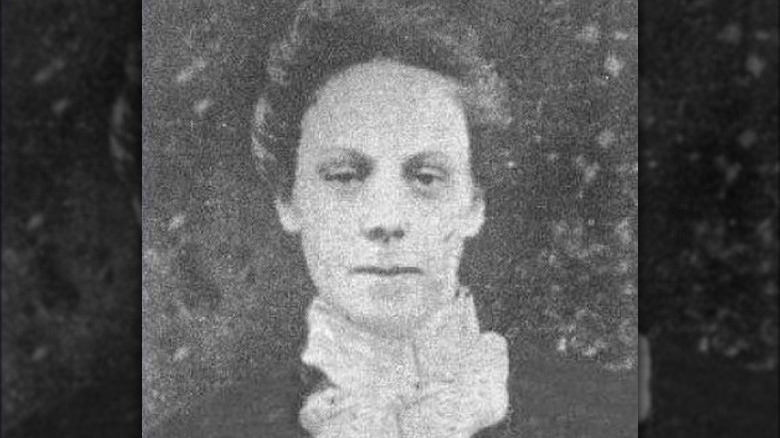The Tragic Story Of The Peasenhall Murder
Peasenhall is a small village located in Suffolk, England, and in the 1900s, everyone knew each other in the tight-knit community. In the village sits Providence House (now called Stuart House), a country home where Baptist elder William Crisp and his wife lived. The couple also had a live-in servant named Rose Harsent who was 22 years old.
On the morning of June 1, 1902, Harsent was discovered dead in the kitchen of Providence House. The news of her death quickly spread throughout the Peasenhall community, and authorities set their sights on William Gardiner, a married man in his mid-30s with six children who was rumored to be having an affair with Harsent, as reported by Unsolved Casebook. The rumors and circumstantial pieces of evidence against Gardiner didn't help his case, but to this day, no one has been held responsible for Harsent's untimely death in the case known as the Peasenhall murder.
Rumors about the affair
William Gardiner was the choir leader at the local church, and Rose Harsent was one of the choir members. In May 1901, rumors about Gardiner and Harsent's alleged affair spread through the community after two men — Alphonso Skinner and George Wright — said they saw the two enter a church building known as the Doctor's Chapel (via Strange Company). The two community members claimed they heard Harsent tell Gardiner that she had been reading about their activities in the Bible and referred to Genesis Chapter 38, which mentions sexual relations.
Talk of Gardiner and Harsent's alleged affair quickly spread to others in the village, and Gardiner was livid. He denied having a sexual relationship with Harsent and demanded an apology from Skinner and Wright, but the two refused and said that they were being truthful. Gardiner was a respected member of the community, and the scandalous rumor pushed Church elders to launch an informal investigation. However, there was no proof of the affair other than the statements of Skinner and Wright, and Gardiner was adamant that he did not have a relationship with Harsent other than being her choir leader.
Rose Harsent's murder
On the morning of June 1, 1902, Rose Harsent's father, William, headed to Providence House to bring his daughter clean linen. Upon entering the home, he saw his daughter lying in a pool of blood at the bottom of the stairs in the kitchen. Authorities were called to the scene, and they initially thought Harsent took her own life. Upon further investigation, however, they discovered that she was murdered, as reported by The Clermont Sun. Harsent's throat was slashed and the bottom part of her body was burnt.
There were several pieces of evidence at the crime scene including paraffin in a prescription bottle for William Gardiner and his wife, as well as letters addressed to the young woman. One of the letters was sent by an unknown individual and read, "Dear R, I will try to see you tonight at 12 o'clock at your place. If you put a light in your window at ten for about then minutes, then you can put it out again." Authorities had a suspicion that the one who wrote the letter was Harsent's killer. According to Unsolved Casebook, authorities also found a copy of a local newspaper at the scene that Harsent's employers didn't subscribe to; Gardiner, however, was subscribed to the paper.
Circumstantial pieces of evidence against William Gardiner
A post-mortem examination was performed on Rose Harsent's body, which revealed more information about her death. She sustained a stab in the chest, and there were bruises on her face. There were also defensive wounds on her hands, which suggested she fought back against her attacker, per the East Anglian Daily Times. The examination also showed that Harsent was six months pregnant at the time of her death.
The pieces of evidence were stacking up against William Gardiner, although they were all circumstantial. The handwriting on the letter found at the scene was similar to Gardiner's, and the newspaper and prescription bottle also pointed to him. Knowing that Harsent was pregnant, authorities theorized that Gardiner was the father of the unborn child, and he wanted her dead to keep his reputation intact. As reported by Unsolved Casebook, Gardiner denied all the allegations against him, but he was, nevertheless, charged with murder.
The trial of William Gardiner
The trial of William Gardiner was held in November 1902. He insisted that he had nothing to do with Rose Harsent's murder and that he was asleep at home the night she was attacked. His statement was backed by his wife, Georgina, per Unsolved Casebook. Gardiner's wife also testified that the bottle of medicine that was found at the crime scene was, indeed, from their home, but she stated that she gave the medicine to Harsent when she was feeling ill. As for the paraffin, Georgina said that Harsent must have filled the bottle with it after finishing the medicine.
A neighbor testified that she had been awake all night on the date of the murder and that she didn't see Gardiner leave his home. The defense argued that the child Harsent was carrying at the time of her death could have been fathered by other men that she had relations with, and they pointed to love letters from different individuals found in her room. The pieces of evidence presented by the prosecution were circumstantial at best, and the jury members weren't able to come up with a unanimous decision. They were deadlocked with 11 jurors voting for a conviction and one saying that there was no real evidence that showed Gardiner was the murderer, according to Strange Company. It ended in a mistrial, and the judge ordered a second trial.
No justice for Rose Harsent
The second trial began in January 1903. The details, more or less, remained the same for the second trial, but the result was the opposite — one juror voted to convict William Gardiner, and 11 voted to acquit him. A third trial was considered, but authorities believed that they would end up with the same outcome, as there was no concrete evidence of Gardiner's guilt, as reported by Dark Curiosities. As a result, he was set free.
Most of those who lived in Peasenhall believed that Gardiner was guilty despite the lack of proof against him. He was neither convicted, nor acquitted. After the trial, the Gardiners decided to move away from Peasenhall, and they started a new life in London. Gardiner lived the remainder of his life quietly until his death in 1941. No other individuals were arrested in connection to Rose Harsent's death, and the Peasenhall murder remains one of the most mysterious unsolved cases in England to this day.





